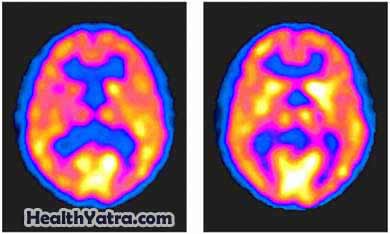Definition
This test makes images that show activity in body tissues. A substance that gives off a tiny amount of radiation is put into your body. This substance goes to the part of you body that is most active. A machine can then detect where that substance is. PET can be done for many body parts, including:
- Whole body
- Brain
- Lungs
- Breast
- Heart

Reasons for Test
A PET scan may be done for a number of reasons, including:
- Looking for tumors or assessing tumor level of activity after treatment
- Assessing causes of memory disorders
- Finding the cause of seizures and helping to find treatments
- Assessing brain metabolism in patients with chronic fatigue syndrome
- Looking for heart disease
Possible Complications
Complications are rare. If you are planning to have a PET scan, your doctor will review a list of possible complications.
Some people have a bad reaction to the contrast dye. The contrast is chemical that improves the details in the pictures. In some people the contrast can cause allergic reactions or kidney problems.
A PET scan does use radiation. You and your doctor will weigh the harms and benefits of this test. A PET scan may not be advised if you are pregnant.
Be sure to discuss these risks with your doctor before the test. Let your doctor know about any allergies or unrelated illnesses you may have.
What to Expect
Prior to Test
- Wear comfortable clothes.
- Do not eat or drink anything, except water, for at least four hours before the scan.
- Check with your doctor about taking your regular medicines.
- If you have diabetes, ask the doctor for specific diet recommendations for the test day, since this can affect your results.
- Tell your doctor if you are or might be pregnant.
Description of Test
A nurse or technologist will give you a radioactive substance. This may be done through an injection, or in some cases, you will be asked to breathe in a gas. It will travel through your blood to the area of the body being studied. It takes 30-90 minutes for the substance to be absorbed by the tissue. Once the substance has been absorbed, the scan can take place.
You will lie on a table and be moved into a machine that looks like a large, square doughnut. This machine detects and records the energy levels from the substance that was injected earlier. The images are viewed on a computer monitor. The scan lasts about 30-45 minutes. You may be asked to perform specific tasks before or during the test. For example, during a heart PET scan, you may be asked to walk on a treadmill.
After Test
Drink plenty of fluids to help the radioactive substance pass from your body.
How Long Will It Take?
At least two hours
Will It Hurt?
Except for the pinprick from the injection, a PET scan is a painless procedure. People who are claustrophobic (uncomfortable in closed or tight spaces) may have someanxiety.
Results
The images will show activity levels as different colors or degrees of brightness. A radiologist will review the images and send the results to your doctor. It may take a few days for your doctor to receive the report.
Call Your Doctor
Call your doctor if you have any unusual symptoms, like a rash, itching, or difficulty breathing. These symptoms may mean that you are having an allergic reaction to the radioactive substance.
